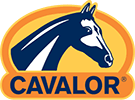A balanced diet for horses consists of a large amount of roughage, together with free access to fresh drinking water. They must consume at least 1.25 % of their body weight in dry matter from roughage. They need fibre to keep their large intestine and the microflora healthy. Many horses can obtain sufficient energy and protein from their roughage. However, if you feed only roughage your horse gets never enough vitamins and minerals. The key to a healthy body is a balanced intake of nutrients. But just as much as the horse needs, so feed as you need.
The why about balancers
Balancers are highly concentrated supplements that are added to the ration to ensure that horses receive all the nutrients they need in the right quantities and proportions. We can split balancers into two different groups: balancers for daily use and balancers for temporary use.
- FOR DAILY USE
Balancers for daily use primarily balance the daily ration by evening out any shortfalls. Here, we are mainly talking about vitamins and minerals that are not present in sufficient quantities in the daily ration. - FOR TEMPORARY USE
Balancers can also be used to meet the horse’s temporarily higher needs for specific nutrients.
About concentrates
Concentrates don’t just provide horses with extra energy and protein. They also contain vitamins and minerals that are essential elements of a balanced diet. In fact, these are what determine the ideal dose of concentrates.
We are seeing a trend where people are starting to feed their horses fewer concentrates and more roughage. This is great news for the horse. Horses are herbivores and need a lot of roughage. But when people feed less than the recommended daily ration of concentrates to limit the amount of energy it can mean the horse’s diet becomes unbalanced. Balancers are the perfect solution: as they are highly concentrated which enabled small quantities to be fed daily or for a short period of time. The horse can then receive his energy and protein from fibre and his vitamin and mineral intake can be ‘balanced’ in small quantities of concentrates.
Back to the beginning
Horses evolved to eat fibre: grass and graze large areas moving around in herds. Scattered over the large distances they covered, they ate what they found: different types of grasses, herbs and munched on trees and shrubs. These provided them with all they needed.
Since the domestication of horses, they have been kept in ever smaller areas. Spending time in a stable and are ridden and worked several times a week. Modern pastures contain only a few types of grass and are mostly rich in energy and protein. This limited variety of grasses and herbs means that roughage is much less varied than in nature and is thus much less rich in certain vitamins and minerals.
The past hundred years has seen the shift from work horse to sports horse and we are understanding more about the physical and psychological wellbeing of the horse. It has meant horse owners are reducing the quantity of concentrates and rely on forage to deliver an adequate supply of energy and protein. But what about other nutrients? The answer is: forage alone is not enough. Although forage forms the basis, it does not always contain enough vitamins, minerals, and trace elements – all important parts of a balanced equine diet.
What is in a balanced diet?
A horse’s feed ration consists of six essential nutrients – i.e., nutrients that the body cannot produce itself:
- carbohydrates (like sugar, starch, and fibre)
- fats
- proteins
- vitamins
- minerals
- water
Horses, like all other living organisms, need vitamins and minerals to keep the body functioning healthily. Vitamins and minerals are essential nutrients which the body needs and which the horse gets from its diet.
Vitamins are important for a horse’s growth, metabolism and immune system. They are needed for metabolic functions and support the functions of organs and other bodily systems. Vitamins are also important for energy production and for good skin, coat and hoof health. Some vitamins must be provided by feed, while others are produced in the horse’s body.
Minerals are also important nutrients for a variety of bodily functions. They support the growth of bones and teeth, transmit nerve impulses, maintain water balance and produce hormones. Minerals like calcium, phosphorus, magnesium and sodium are especially important for horses as they are needed for healthy growth and development.
Anything else?
Trace elements are often named in the same breath as vitamins and minerals because they include iron, zinc, copper, selenium, iodine and fluorine, which are all important for various bodily processes.
The right ratio of minerals and trace elements is important as they interact to support various processes in the body. If this ratio is off, it can lead to a disruption in these processes, which in turn can cause health problems.
Finally, 3 steps to a balanced diet:
- If you are feeding a concentrate at less than the recommended rate you should change to a ‘balancer’ Avoiding deficiencies is consequently of key importance. Ensure that you provide a balanced diet that contains sufficient vitamins and minerals. In addition to ensuring that horses take in enough minerals, it is also important that they absorb the right balance of the various minerals. The balance between the various minerals in the body is very important to the proper functioning of all the body’s processes.
- Energy Expenditure. Remember “feed as you need”! A sport horse or breeding horse will have higher vitamin/mineral requirements than a leisure horse. Vitamins and minerals are Essential for all types of horses types of horses. Make sure your horse is on an appropriate balancer for his needs.
- Fibre source. If your horse is receiving all his protein and energy from roughage make sure he is receiving enough. Check the quantities and the quality consumed.

